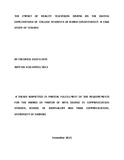| dc.description.abstract | The Media has continued to grow over the years in stature and by way of product
variety, technology and content depth. Such growth has come with several advantages
being felt in Kenya by the various stakeholders in the industry namely the media
owners, advertiser, policy makers and the audience. It is important for researchers to
look at what Kenyan audience; in this case college youths, may be learning from
television programming and more so, from the Reality Dating Shows like Tujuane which
continues to gain presence and dominance during prime time in some of the Leading
TV stations in Kenya such as KTN and NTV in the recent past.
The study attempted to assess the impact of Reality Television Drama Tujuane by
analyzing the dating patterns of the college youths of Kibra Constituency, Nairobi
County. The study embraced a case study design and used both questionnaires and
interview schedule for data collection. Uses and Gratification Theory and Cultivation
theory were both used to provide the analytical foundations and theoretical framework
for analysis of dating skills and possible imitations and behaviour of characters after
long exposure to Reality Dating Shows.
The study established that 97% of the College youths that reside in Kibra watch Reality
Dating Shows, whereas only 3% of the youths said they do not watch the Reality TV
programme. This is a very significant number indicating the popularity of the
programme and possible big influence on the youths. The study also established that
23.33% of them watch RTVs very often, while 60% watches often and 16.67 rarely
v
watch. This may imply that RTVs have a great appeal and a loyal audience amongst the
College Youths of Kibra. On the scheduling of the program to air just before the news at
8:30 pm, the study established that the timing was right with a majority 72.5% of the
total respondents supporting the timing, while 27.50% of the respondents believed that
the program was aired at the wrong time. On what they remembered the most after
watching Tujuane dating show, the youths remembered controversies, casual use of
language, dress code, efforts by the partners dating to impress, obsession with physical
attributes such as height, weight, skin color and language mastery. Nearly all the
respondents concur that what they remembered the most is either what exited them,
rubbed them the wrong way or re-affirmed their way of life.
The other finding was that the youths had to seek authorization from their parents or
guardian before watching Tujuane Reality Show, thus 51.6% of the youths needed
parental approval since they were considered minors by their parents and guardians
and also because the TV was a shared facility that served the needs of everyone in the
family. The remaining 48.4% had the freedom to view the program without restrictions
largely because they lived alone and secondly in minor circumstances, it was because
their parents were never home at the time the program was aired. On the existing
knowledge and consistency with the new information from Tujuane show, a majority
totaling 70.8% of the respondents confirmed that there were similarities between what
they already knew about dating and the information from Tujuane RTV. The preexisting
knowledge on dating they attributed to peer knowledge from the affluent
vi
colleagues in the Colleges whose parents could afford pay TV and were routine
audiences to such programs from global media platforms.
The study recommends that; Media producers should reduce the non-essential
controversies during the production of the Dating Shows and increase the percentage of
dating facts available to the audience, maybe through a fact sheet or through expert
opinion. This is because the media has the capacity to create perception that Cultivation
theorists believe can make the audiences begin to view the real world as it exists on
television. Any increase in conflict, aggression, poor use of language and skewed
perception of partner attributes, can create a distortion in the dating world of the
college youths. To the contrary, accurate presentation of dating facts that respect the
societal way of life can only lead to proper orientation of fundamental dating elements
of our society. The other recommendation is that the media programmes should
include a notice to the audiences that the activities on their dating shows are highly
controlled and might not completely reflect the on goings in a natural dating scenario
away from the cameras. This would create safety to majority youths who mistakenly
might rely on the activities of the dating shows in handling their dating partners in real
life. | en_US |

